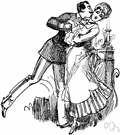dare
Also found in: Thesaurus, Medical, Legal, Financial, Acronyms, Idioms, Encyclopedia, Wikipedia.
DARE
dare
(dâr)dare
(dɛə)dare
(dɛər)v. dared, daring; pres. sing. 3rd pers. dares dare, v.i.
Dare
(dɛər)n.
dare
If you dare to do something, you have the courage to do it. You use dare on its own, or with an infinitive with or without to.
In this meaning, dare is often used in negative sentences and questions.
If someone daren't do something, they don't have enough courage to do it.
In American English, the contraction 'daren't' is not used. American English uses the full form dare not instead.
Be Careful!
You must use an infinitive without to after daren't and dare not. Don't say, for example, 'I daren't to ring Jeremy again'.
If you are talking about the past, you say that someone did not dare do something or didn't dare do something. After did not dare and didn't dare you can use an infinitive with or without to.
In formal writing, you can say that someone dares not do something. Dare not is always followed by an infinitive without to.
In other kinds of negative sentence, you can use an infinitive with or without to after dare.
In yes/no-questions, you put the base form dare in front of the subject without using an auxiliary verb or modal. After the subject, you use an infinitive without to.
In wh-questions, you use a modal such as would in front of dare. After dare, you use an infinitive with or without to.
If you dare someone to do something, you challenge them to prove that they are not frightened of doing it.
You say I dare say or I daresay to show that you think that something is probably true.
Be Careful!
I dare say is a fixed phrase. Don't say, for example, 'You dare say' or 'I dare to say'.
dare
Past participle: dared
Gerund: daring
| Imperative |
|---|
| dare |
| dare |
| Noun | 1. |  dare - a challenge to do something dangerous or foolhardy; "he could never refuse a dare" dare - a challenge to do something dangerous or foolhardy; "he could never refuse a dare"challenge - a call to engage in a contest or fight |
| Verb | 1. |  dare - take upon oneself; act presumptuously, without permission; "How dare you call my lawyer?" dare - take upon oneself; act presumptuously, without permission; "How dare you call my lawyer?" |
| 2. | dare - to be courageous enough to try or do something; "I don't dare call him", "she dares to dress differently from the others" | |
| 3. | dare - challenge; "I dare you!" brazen - face with defiance or impudence; "brazen it out" challenge - issue a challenge to; "Fischer challenged Spassky to a match" |
dare
"Who dares wins" Motto of the British SAS regiment
dare
verbdare
[dɛəʳ]to dare sb to do sth → desafiar or retar a algn a hacer algo
I dare you! → ¡a que no te atreves!
to dare (to) do sth → atreverse a hacer algo
I daren't → no me atrevo
I daren't tell him → no me atrevo a decírselo
how dare you! → ¡cómo te atreves!, ¡qué cara!
don't or just you dare! → ¡ni se te ocurra!
I dare say that → no me sorprendería que + subjun
I dare say you're tired → supongo que estás cansado
dare I say it → me atrevería a decir
dare
[ˈdɛər]to dare do sth → oser faire qch
I daren't tell him (British) → Je n'ose pas le lui dire.
to dare to do sth → oser faire qch
I didn't dare to tell my parents → Je n'ai pas osé le dire à mes parents.
Don't you speak to me like that. Don't you dare
BUT Ne me parle pas comme ça. Je te l'interdis.
don't you dare go ... → je t'interdis d'aller ...
how dare you! → comment osez-vous!
How dare you listen to my conversations! → Comment osez-vous écouter mes conversations!
I dare say it'll be okay → Je suppose que ça va aller. (= I expect) → je suppose que ...
I dare say he'll turn up
BUT Il viendra sans doute.
dare I say it (= excuse me for saying this) → si je puis me permettre